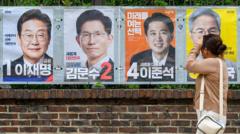The fate of Yoon Suk Yeol, South Korea's impeached president, hangs in the balance as the Constitutional Court prepares to announce whether he will be permanently removed from office or reinstated.
South Korea Awaits Verdict on Yoon Suk Yeol's Presidential Future

South Korea Awaits Verdict on Yoon Suk Yeol's Presidential Future
The Constitutional Court's decision on Yoon's impeachment could alter South Korea's political landscape.
The political tension in South Korea escalates as the Constitutional Court is set to reveal its decision regarding Yoon Suk Yeol's impeachment on Friday. The president, who faced impeachment in December due to his controversial declaration of martial law, has been suspended since the National Assembly’s vote. The court must determine if Yoon will be permanently removed from the presidency or restored to power, a decision that will significantly impact the future of South Korean politics.
Yoon’s downfall began on December 3 when he announced martial law amid civil unrest, a move deemed authoritarian by many citizens, leading to widespread protests. A ruling to remove him from office requires a majority vote from six of the eight justices on the court, emphasizing the critical nature of this decision. If the court rules against him, Yoon would join the ranks of Park Geun-hye, the only other South Korean president to be ousted via impeachment in 2017.
The political climate could shift dramatically if Yoon is removed, with a new election mandated within 60 days to find his successor. Conversely, if he is reinstated, he will face the monumental challenge of governing a populace that has significantly turned against him due to his previous actions. Yoon was detained on January 15 under insurrection charges linked to his failed martial law attempt but was released shortly after, intensifying scrutiny around his next steps.
As the nation holds its breath for Friday’s announcement, the implications of the court’s ruling are profound, potentially signaling either a restoration of confidence in democratic processes or further turmoil in South Korea's political landscape.
Yoon’s downfall began on December 3 when he announced martial law amid civil unrest, a move deemed authoritarian by many citizens, leading to widespread protests. A ruling to remove him from office requires a majority vote from six of the eight justices on the court, emphasizing the critical nature of this decision. If the court rules against him, Yoon would join the ranks of Park Geun-hye, the only other South Korean president to be ousted via impeachment in 2017.
The political climate could shift dramatically if Yoon is removed, with a new election mandated within 60 days to find his successor. Conversely, if he is reinstated, he will face the monumental challenge of governing a populace that has significantly turned against him due to his previous actions. Yoon was detained on January 15 under insurrection charges linked to his failed martial law attempt but was released shortly after, intensifying scrutiny around his next steps.
As the nation holds its breath for Friday’s announcement, the implications of the court’s ruling are profound, potentially signaling either a restoration of confidence in democratic processes or further turmoil in South Korea's political landscape.




















